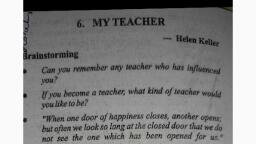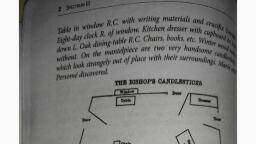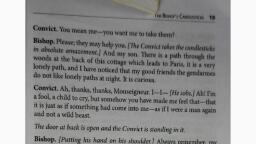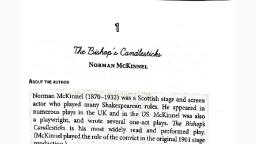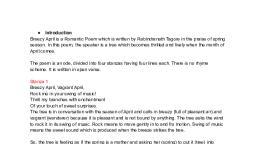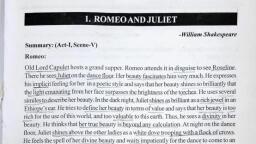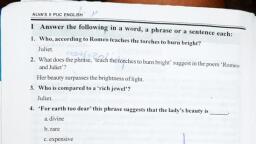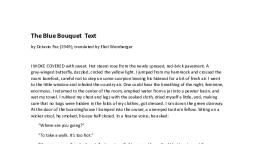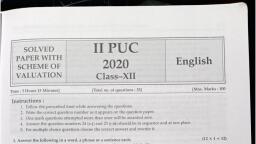Page 1 :
who became the youngest writer ever to be elected to t, Edmond Rostand (1868-1918) was a French poet and playwri, Académie Française, the pre-eminent council of French langu, Bergerac, the premise of which has inspired countless fil, plays, stories, and television shows in multiple languages aro, and literature. He is best known for his famous play Cyrano, The Romancers, A Comedy in Three Acts, EDMOND ROSTAND, ABOUT THE AUTHOR, the world. His other dramatic works of note are, L'Aiglon a, Chantecler. Rostand's neo-romantic style contrasted sharnly, the grim naturalism of late nineteenth-century theatre. His pla, were written in verse, and were often about romance and herois, blending a fast-paced comic plot with colour and costume., THE PLAY, Characters, Sylvette, Percinet, Straforel, may be seen, to some extent, in this play.
Page 2 :
THE ROMANCERS 41, Bergamin, Percinet's father, Pasquinot, Sylvette's father, Blaise,, a gardener, A wall, not a speaking part, Swordsmen, musicians, negroes, torch-bearers, a notary,, four witnesses, and other supernumeraries., The action takes place anywhere, provided the costumes are pretty., Act I, Scene: The stage is divided by an old wall, covered with vines and, flowers. At the right, a corner of BERGAMIN'S private park; at the left,, a corner of PASQUINOT'S. On each side of the wall, and against it, is a, rustic bench. As the curtain rises, PERCINET is seated on the top of the, wall. On his knee is a book, out of which he is reading to SYLVETTE,, who stands attentively listening on the bench which is on the other side, of the wall., Sylvette. Monsieur Percinet, how divinely beautiful!, Percinet. Is it not? Listen to what Romeo answers: [Reading.], 'It was the lark, the herald of the morn,, wall: Rostand's stage directions indicate that the wall may be played by a non-, speaking actor who stands still; however, most productions would prefer to use, a stage prop., notary: someone legally empowered to witness signatures and certify a, document's validity, supernumerary: (here) a minor actor in crowd scenes, rustic: characteristic of rural life, monsleur: a French courtesy title, equivalent to 'mister' in English, Romeo .. Jullet: Rostand's play parodies many of the elements of Shakespeare's, Romeo and Julet. Percinet and Sylvette see themselves as star-crossed lovers,, when in fact their fathers are not enemies but close friends who wish to see their, children married,, It was the lark': Percinet is reading from Act III Scene 5 of Romeo and Juliet., In these lines, Shakespeare's lovers are about to be parted, and they stretch out, their farewell. Percinet and Sylvette consciously imitate the poetic language and, imagery of Romeo and Jultet.
Page 3 :
Percinet. [Listens a moment, then.] No one! And, Mademoiselle,, must not take fright like a startled bird. Hear the immortal lover, mademoiselle: a French courtesy title for a young unmarried woman (equiv, accompaniment. And see, these green shades! But, Monis, 42 ARTICULATION II, No nightingale: look, love, what envious streaks, Do lace the severing clouds in yonder east., Night's candles are burnt out, and jocund day, Stands tiptoe on the misty mountain tops:, I must be gone'-, Sylvette. [Interrupts him, as she listens.] Sh!, a, Juliet. Yon light is not the daylight, I know it, I,, It is some meteor that the sun exhales,, To be to thee this night a torch-bearer,, And light thee on thy way to Mantua:, Therefore stay yet, thou need'st not to be gone., Romeo. Let me be taen, let me be put to death;, I am content, so thou will have it so., I'll say, yon gray is not the morning's eye,, 'Tis but the pale reflex of Cynthia's brow;, Nor that is not the lark, whose notes do beat, The vaulty heaven so high above our heads:, I have more care to stay than will to go:, Come, death and welcome-, Sylvette. No, he must not say such things, or I shall cry., Percinet. Then let us stop and read no further until to-morrow, shall let Romeo live! [He closes the book and looks about him., charming spot seems expressly made, it seems to me, to clau, words of the Divine Will!, Sylvette. The verses are divine, and the soft air here is a, Percinet, what makes them divine to me is the way you, read!, Percinet. Flatterer!, to 'miss' in English), cradle: (verb) to hold gently and carefully, Divine Will: William Shakespeare
Page 4 :
THE ROMANCERS 43, Sylvette. [Sighing.] Poor lovers! Their fate was cruel! [Another sigh.], I think-, Percinet. What?, Sylvette. Nothing!, Percinet. Something that made you blush red as a rose., Sylvette. Nothing, I say., Percinet. Ah, that's too transparent. I see it all: you are thinking of, our fathers!, Sylvette. Perhaps-, Percinet. Of their terrible hatred for each other., Sylvette. The thought often pains me and makes me cry when I am, alone. Last month, when I came home from the convent, my father, pointed out your father's park, and said to me: 'My dear child, you, behold there the domain of my mortal enemy, Bergamin. Never cross, the path of those two rascals, Bergamin and his son Percinet. Mark, well my words, and obey me to the letter, or I shall cast you off as an, enemy. Their family has always been at bitter enmity with our own', And I promised. But you see how I keep my word!, Percinet. Did I not promise my father to do the same, Sylvette? Yet, I love you!, Sylvette. Holy saints!, Percinet. I love you, my dearest!, Sylvette. It's sinful!, Percinet. Very-but what can we do? The greater the obstacles to be, overcome, the sweeter the reward. Sylvette, kiss me!, Sylvette. Never! [She jumps down from the bench and runs off a few, steps.], convent: (here) a school (for girls) attached to and run by a Christian community, of nuns, domain: (here) territory over which rule or control is exercised, mortal enemy: an enemy who wants to kill you
